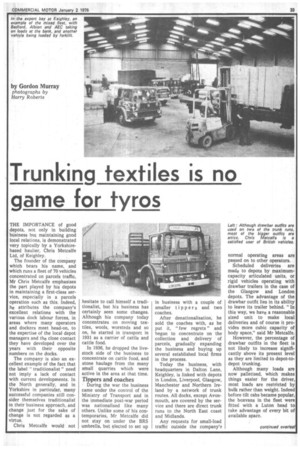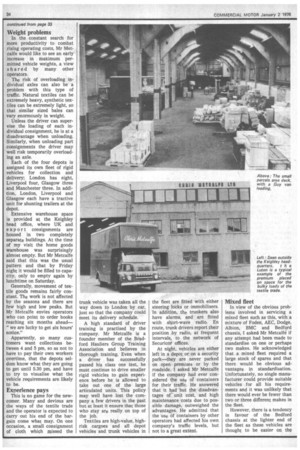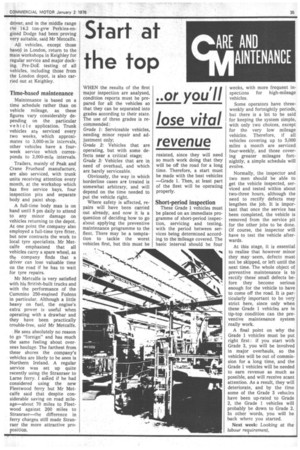Trunking textiles is no
Page 35

Page 36

Page 37

If you've noticed an error in this article please click here to report it so we can fix it.
game for tyros THE IMPORTANCE of good depots, not only in building business but maintaining good local relations, is demonstrated very topically by a Yorkshirebased haulier, Chris Metcalfe Ltd, of Keighley.
The founder of the company which bears his name, and which runs a fleet of 70 vehicles concentrated on parcels traffic, Mr Chris Metcalfe emphasises the part played by his depots in maintaining a first-class service, especially in a parcels operation such as this. Indeed, he attributes the company's excellent relations with the various dock labour forces, in areas where many operators and dockers meet head-on, to the expertise of the local depot managers and the close contact they have developed over the years with their opposite numbers on the docks.
The company is also an excellent example of the fact that the label " traditionalist " need not imply a lack of contact with current developments. In the North generally, and in Yorkshire in particular, many successful companies still consider themselves traditionalist in their business approach, and change just for the sake of change is not regarded as a virtue, Chris Metcalfe would not hesitate to call himself a traditionalist, but his business has certainly seen some changes. Although his company today concentrates on moving textiles, wools, worsteds and so on, he started in transport in 1931 as a carrier of cattle and cattle food.
In 1936, he dropped the livestock side of the business to concentrate on cattle food, and stone haulage from the many small quarries which were active in the area at that time.
Tippers and coaches
During the war the business came under the control of the Ministry of Transport and in the immediate post-war period was nationalised like many others. Unlike some of his contemporaries, Mr Metcalfe did not stay on under the BRS umbrella, but elected to set up in business with a couple of smaller tippers and two coaches.
After denationalisation, he sold the coaches with, as he put it, "few regrets " and began to concentrate on the collection and delivery of parcels, gradually expanding the business and buying up several established local firms in the process.
Today the business, with headquarters in Dalton Lane, Keighley, is linked with depots in London, Liverpool, Glasgow, Manchester and Northern Ireland by a network of trunk routes. All docks, except Avonmouth, are covered by the service and there are direct trunk runs to the North East coast and Midlands.
Any requests for small-load traffic outside the company's normal operating areas are passed on to other operators.
Scheduled deliveries are made to depots by maximumcapacity articulated units, or rigid vehicles operating with drawbar trailers in the case of the Glasgow and London depots. The advantage of the drawbar outfit lies in its ability to leave its trailer behind. "In this way, we have a reasonable sized unit to make local deliveries and of course it provides more cubic capacity of body space," said Mr Metcalfe.
However, the percentage of drawbar outfits in the fleet is not likely to increase significantly above its present level as they are limited to depot-todepot trunking.
Although many loads are now palletised, which makes things easier for the driver, most loads are restricted by bulk rather than weight. Indeed before tilt cabs became popular, the boxvans in the fleet were fitted with a Luton head to take advantage of every bit of available space.
Weight problems
In the constant search for more productivity to combat rising operating costs, Mr Met calfe would like to see an early increase in maximum permitted vehicle weights, a view shared by many other operators.
The risk of overloading individual axles can also be a problem with this type of traffic. Natural textiles can be extremely heavy, synthetic tex tiles can be extremely light, so that similar sized bales can vary enormously in weight.
Unless the driver can supervise the loading of each individual consignment, he is at a disadvantage when unloading. Similarly, when unloading part consignments the driver may well risk temporarily overloading an axle.
Each of the four depots is assigned its own fleet of rigid vehicles for collection and delivery; London has eight, Liverpool four, Glasgow three and Manchester three. In addition, London, Liverpool and Glasgow each have a tractive unit for shunting trailers at the depot.
Extensive warehouse space is provided at the Keighley head office, where UK and export consignments are housed in •two completely separate buildings. At the time of my visit the home goods warehouse was surprisingly almost empty. But Mr Metcalfe said that this was the usual pattern and •that by Friday night it would be filled to capacity, only to empty again by lunchtime on Saturday.
Generally, movement of textile goods remains fairly constant. The work is not affected by the seasons and there are few high and low peaks. But Mr Metcalfe envies operators who can point to order books reaching six months ahead" we are lucky to get six hours' notice."
Apparently, so many customers want collections between 4 and 5 pm, so as not to have to pay their own workers overtime, that the depots seldom know what they are going to get until 5.30 pm, and have to try to visualise what the vehicle requirements are likely to be.
Experience pays
This is no game for the newcomer. Many and devious are the ways of the textile trade and the operator is expected to carry out his end of the bargain come what may. On one occasion, a small .consignment of ClOth which missed the trunk vehicle was taken all the way down to London by car, just so that the company could meet its delivery schedule.
A high standard of driver training is practised by the company. Mr Metcalfe is a founder member of the Bradford Hauliers Group Training Association and believes in thorough training. Even when a driver has successfully passed his class one test, he must continue to drive smaller rigid vehicles to gain experience before he is allowed to take out one of the large articulated units. This policy may well have lost the company a few drivers in the past but at least it ensure that those who stay are really on top of the job.
Textiles are high-value, highrisk cargoes and all depot vehicles and trunk vehicles in the fleet are fitted with either steering locks or immobilisers. In addition, the trunkers also have alarms, and are fitted with short-wave radio. En route, trunk drivers report their position by radio, at frequent intervals, to the network of S ecuricor offices.
At night, vehicles are either left in a depot or on a security park—they are never parked on open premises or by the roadside. I asked Mr Metcalfe if the company had ever considered the use of containers for their traffic. He answered that it had but the disadvantages of unit cost, and high maintenance costs due to possible damage, outweighed the advantages. He admitted that the use of containers by other operators had affected his own company's traffic levels, but not to a great extent.
Mixed fleet
In view of the obvious problems involved in servicing a mixed fleet such as this, with a mixture of Foden, AEC, Dodge, Albion, BMC and Bedford chassis, I asked Mr Metcalfe if any attempt had been made to standardise on one or perhaps two makes. He acknowledged that a mixed fleet required a large stock of spares and that there would be obvious advantages in standardisation. Unfortunately, no single manufacturer could provide suitable vehicles for all his requirements and it was unlikely that there would ever be fewer than two or three different makes in the fleet.
However, there is a tendency in favour of the Bedford chassis at the lighter end of the fleet as these vehicles are thought to be easier on the driver, and in the middle range the 14.2 ton-gvw Perkins-engined Dodge had been proving very suitable, said Mr Metcalfe.
All vehicles, except those based in London, return to the main workshops in Keighley for regular service and major docking. Pre-DoE testing of all vehicles, including those from the London depot, is also carried out at Keighley.
Time-based maintenance
Maintenance is based on a time schedule rather than on vehicle mileage, as these figures vary considerably depending on the particular vehi c I e application. Trunk vehicles are serviced every two weeks, which approximates to 3,000-mlle intervals, other vehicles have a fourweek service which corresponds to 2,000-mile intervals.
Trailers, mainly of Peak and Crane Fruehauf manufacture, are also serviced, with trunk units receiving attention every month, at the workshop which has five service bays, four inspection pits and separate body and paint shop.
A full-time body man is on hand until 8 pm daily to attend to any minor damage on vehicles returning to the depot. At one point the company also employed a full-time tyre fitter, but now contracts the work to local tyre specialists. Mr Metcalfe emphasised that all vehicles carry a spare wheel, as the company finds that a driver can lose valuable time on the road if he has to wait for tyre repairs.
Mr Metcalfe is very satisfied with his British-built trucks and with the performance of the Cummins 250-engined Fodens in particular. Although a little heavy on fuel, the engine's extra power is useful when operating with a drawbar and they have been practically trouble-free, said Mr Metcalfe.
He sees absolutely no reason to go "foreign" and has much the same feeling about overseas haulage. The farthest from these shores the company's vehicles are likely to be seen is Northern Ireland. A regular service was set up quite recently using the Stranraer to Larne ferry. I asked if he had considered using the new Fleetwood ferry but Mr Metcalfe said that despite considerable saving on road mileage—about 70 miles to Fleetwood against 200 Miles to Stranraer—the difference in ferry charges still made Stranraer the more attractive proposition;




































































